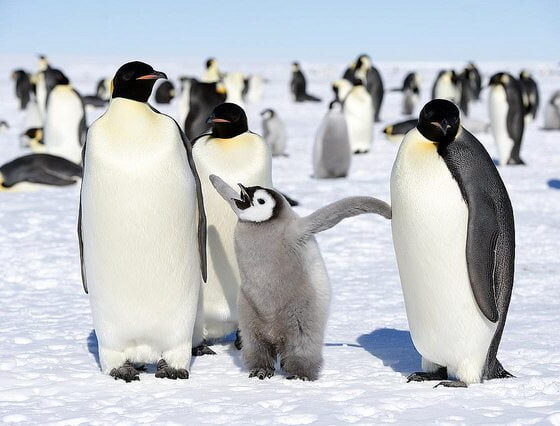

Environment
Emperor penguins at extinction risk because of climate change
Climate change will present a severe threat to the iconic emperor penguin, as temperatures rise and the Antarctic sea-ice that the species depends on disappears, a new study has warned.
In a new report, researchers from around the world have urged governments to list emperor penguins – the world’s largest penguin species – as endangered, even though their numbers are expected to rise in the coming decades.
Despite optimistic short-term forecasts, the study suggests that all of the 45 known colonies would be in decline by the end of the century, with as many as two-thirds cut by more than 50%, if the Antarctic warms as expected.
A separate, recently-published study suggested that emperor penguins are not as attached to their nesting locations as previously thought, meaning that they are more able to adapt to their changing environment.
However, the new study estimates that numbers across the continent will fall regardless. Overall, it is thought that populations will drop by at least 19% from today’s levels.
While countless species are threatened by changing climates around the world, emperor penguins are particularly vulnerable to changes in Antarctic sea-ice concentration.
This is because they rely on “a goldilocks point” of ice.
“Too much ice requires longer trips for penguin parents to travel to the ocean to hunt and bring back food for their chicks,” explained lead author Stephanie Jenouvrier, of the Woods Hole Oceanographic Institution (WHOI), a leading marine research organisation.
“But too little ice reduces the habitat for krill, a critical food source for emperor penguins. Our models take into account both the effects of too much and too little sea ice in the colony area.”
If emperor penguins were afforded protected status, then restrictions on tourism and fishing operations in their habitats could be imposed.
“When a species is at risk due to one factor – in this case, climate change – it can be helped, sometimes greatly, by amelioration of other factors,” said co-author Hal Caswell, of WHOI and the University of Amsterdam.
“That’s why the Endangered Species Act is written to protect an endangered species in a number of ways – exploitation, habitat, disturbance – even if those factors are not the cause of its current predicament.”
While the report gives much cause for concern, it does suggest that the instantly recognisable species “can act as an iconic example of a new global conservation paradigm for species threatened by future climate change”.
Photo: Christopher Michel via Flickr
Further reading:
Study shows penguins are adapting to changing Antarctic environment
Penguins scale cliffs to escape climate change
Climate change major threat to biodiversity, study says
Antarctica’s Ross Sea could be ice-free by 2100, threatening ‘ocean’s most pristine ecosystem’
Climate change linked to penguin chicks deaths in Argentina


 Environment12 months ago
Environment12 months agoAre Polymer Banknotes: an Eco-Friendly Trend or a Groundswell?

 Features11 months ago
Features11 months agoEco-Friendly Cryptocurrencies: Sustainable Investment Choices

 Features12 months ago
Features12 months agoEco-Friendly Crypto Traders Must Find the Right Exchange

 Energy11 months ago
Energy11 months agoThe Growing Role of Solar Panels in Ireland’s Energy Future





























